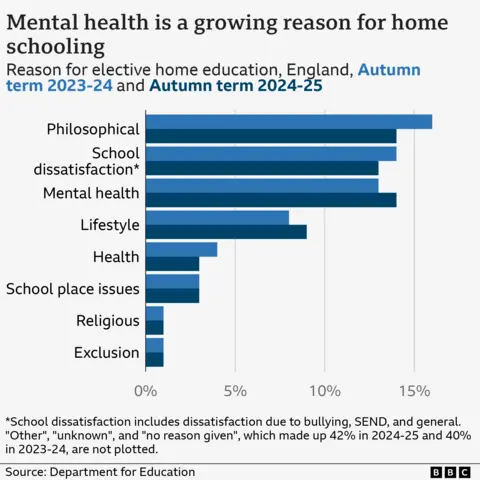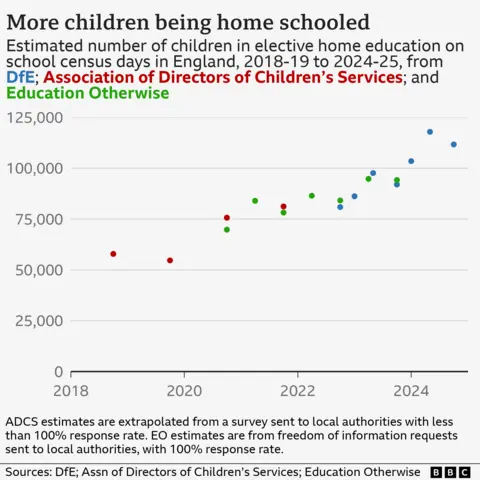 BBC
BBC“Toby was so tremendously unhappy in school,” says his father, Daniel. “We were standing outside the classroom door for an hour every morning and he just didn’t want to go in.
“[It reached the point where] we thought ‘this doesn’t work.'”
Daniel says he tried everything to settle him. Toby, who is now eight, was allowed into the classroom before other children arrived and his teacher also arranged for him to hand out books, but nothing helped.
So, in May 2023 his parents decided to withdraw him from school.
They are not the only ones. Government statistics released on Thursday found that a growing number of parents have withdrawn their children from mainstream education in England. An estimated 111,700 children are being home-educated, based on a census taken this year – marking a 20% rise since last year.
Around 23% say their reasons for home-educating are a result of lifestyle, philosophical or preferential choices, such as religious or cultural beliefs or a rejection of an exam-based education: something that has long been the case.
But 13% of families now say they made this decision because of school dissatisfaction, including a lack of support for special educational needs and disabilities (SEND) and school bullying.
In addition, 14% say it is due to their child’s mental health.

This is the first time the data has become mandatory, which the Department for Education says may account in part for the increase.
Wendy Charles-Warner, chair of home education charity Education Otherwise, says that she is shocked by the increase in the numbers. “It’s not from parents who are wanting to home-educate,” she argues, “but because the school was not meeting their child’s needs, and those parents should not be home-educating, because they don’t want to be. Home education is not easy.”
Daniel says that this was the case for Toby. “We had no alternative… the system is broken and does not cater for a lot of children.”
Toby has attention deficit hyperactivity disorder (ADHD), he explains, and requires a very flexible schedule, allowing him to spend a few minutes or a few hours on an activity, or learn “on the move” so he is not confined to sitting at a desk.
Two of Daniel’s older children, who are both autistic, are doing well at a special school but he says that Toby’s educational needs aren’t severe enough to qualify him for a place.
 Daniel
Daniel“I don’t claim to be a great teacher,” he continues. “But I’ve got enough creativity and inquisitiveness to find learning opportunities as we go.”
They start the day with 20 minutes of reading. On the day we meet, they’re looking at a storybook full of illustrations. Their week so far has also included gymnastics, ice-skating and forest walks.
As Daniel explains all of this, Toby is busy figuring out a puzzle in a maths workshop in a meeting room near their south London home with a group of other home-educated children.
Post-pandemic: a perfect storm
Covid lockdowns gave families a glimpse into the world of home education, as video communication technology suddenly became commonplace in many schools. Digital learning businesses and online schools sprung up too.
What followed was a perfect storm: as schools re-opened, some children found the transition back to the classroom difficult, resulting in an increase in persistently absent children – around double the levels seen before the pandemic.
The latest figures from the Department for Education show that nearly one in five children missed school more than 10% of the time in the autumn and spring terms of 2023/24.
Earlier this month, Sir Martyn Oliver, the chief inspector of Ofsted, England’s schools regulator, said that the issue of children missing school was a “stubborn and damaging issue”, and expressed concern over “flexi-schooling”, where parents educate their children at home for part of the week.
“Even ten years ago [many people had] quite an idealised vision of home education involving self-directed learners who go off to Cambridge,” explains Amber Fensham-Smith, co-director of the Open University’s Children’s Research Centre. “The situation is a lot more complex now.”

“It’s plugging a gap,” she continues. “If your child is struggling with their mental health, you can’t get an NHS referral and you want to keep them safe, what do you do? That’s very different to a parent who chooses it.”
The Department for Education says it knows “far too many children with SEND aren’t having their needs met” and recently announced £740m of funding to increase the number of places for pupils within mainstream schools.
More than 1.6 million children have SEND in schools in England, an increase of 101,000 from 2023. Experts say there are various reasons for this, including greater awareness.
In October, the public spending watchdog warned the special educational needs system is broken and families have lost confidence in it. Which begins to explain part of the spike in home education.
What remains unclear is how effective this is as a solution.
In the US, a much larger proportion of the population – an estimated 6% of children – learn at home, and studies there have found that home-educated children perform as well as, or outperform, their peers in most academic tests.
However, some experts point to the fact that participants in surveys tend to be in highly educated, middle-class families with internet access, which leaves out under-represented groups.
In the UK, the Education Committee called on the government in 2021 to commission research on the life chances and social outcomes of home-educated children – but three years later, the research is still limited.
One challenge with measuring success in the UK is that there is no obligation for home-educated children to follow the national curriculum or sit exams. Parents simply have a duty to provide a “suitable education”.
Earlier this month, the Education Policy Institute, an independent research organisation, warned that a lack of clarity around the law and what is required, “potentially risks some children missing out,” and that not knowing who or where they are “raises questions about variation in the quality and suitability of home education.”
 Fadoua Govaerts
Fadoua GovaertsOthers argue that there should be, for example, a minimum bar required for literacy and numeracy.
But Fadoua Govaerts, who taught her five children at home and has a PhD from the University of Bath that focused on home-education experiences, believes that it’s right for it to have the flexibility to be “more holistic and inclusive”.
“Outcomes could be anything from being comfortable within their own skin, finding a new talent, become an elite athlete or actor, to gaining national qualifications or becoming an entrepreneur as a teenager,” she says.
What the children say
Riyad Ozpolat has never been to school. He is 12 years old now and lives in Bristol with his parents and four siblings. His mother Weronika, a speech and language therapist, works one day a week at a school and the rest of the time home-educates three of her children.
“I’ve been home-schooled my whole life”, explains Riyad, as he swings on an office chair, while his 18-month old sister wanders around behind him. “The reason I don’t want to go to school is because I don’t know if I’ll be able to cope with sitting down.”
He sees his best friends every week at Scouts and says that he doesn’t feel he’s missing out on anything.
Ms Ozpolat says that home-educating her children gives them a chance to focus on their passions. “There’s so much wasted time at school. I think the earlier that they can focus on their interests the better because it just means they have more expertise and extra knowledge in the thing they want to do when they’re older”.
However, she continues: “As the children get older, we need to pay for them to do the GCSE exams. If they’re having extra tuition and you have to pay for all of the books and resources that you need to get in order to do the exam.”
Parents who choose to home-educate take on full financial responsibility – there is no specific government support for home education.
Children who are home-educated are not obliged by law to sit their GCSE exams, but if they choose to, they normally have to pay an exam board fee and an exam centre fee. Prices vary widely but for example the total cost of sitting all three GCSE maths papers at one private exam centre in London, would be £225.
Then there is the question around whether a home education always prepares people well for certain workplaces. Rachael Barrow, who is now 31, was home-educated for nine years after being bullied in school, and says she loved being taught away from the traditional classroom, but when she entered the workplace she found certain challenges.
During her first job, in human resources, she struggled to adjust to having a fixed routine. “I felt as though I was losing some of my autonomy in deciding my own schedule”, she says.
 Rachael Barrow
Rachael BarrowShe has since changed careers and is now completing a PhD at Lancaster University. As part of this she has interviewed other adults who were previously home-educated, and found they tended to avoid corporate careers or 9-5 jobs.
Some told her that “politics in the workplace” was a struggle.
However she is positive about the experience overall: “I don’t regret being home-educated at all”, she says. “I think it set me up quite nicely for a career in academia.”
Safeguarding and registers
Some critics argue that there are gaps around regulating home-education in the UK. The current rules don’t require a parent to tell the council if they are home-educating their child from the start; they only stipulate that a school must tell the local authority if a child has been de-registered.
“The UK is an absolute outlier in being the least regulated in Europe,” says Daniel Monk, professor of law at Birkbeck, University of London.
The death of 10-year-old Sara Sharif, who was removed from school by her father and stepmother to be home-educated, after her teachers raised concerns with social services, has added to the debate around strengthening regulation.
Dame Rachel de Souza, the Children’s Commissioner for England, said it was “madness” that the law currently allowed parents to take a child out of school when concerns had already been raised.
The government has set out plans to introduce a requirement for families subject to a protection plan to get council permission before removing a child from school to be home-educated.
Earlier this year it also announced plans to introduce a national register in England to help account for all home-educated children. This could come into force in 2025.
Dame Rachel has welcomed the decision. “If we get proper registers, and we have local authorities taking their role seriously to engage with these families, we may find we can get lots of them back to school, which is where they need to be”, she told the Education Committee in November.
But Wendy Charles-Warner argues that it is “deeply offensive” to parents to suggest that every child is at risk unless the local authority knows where they are. “Home education is a big ask of parents. In most cases it’s a positive move for their child, because they’re acting to protect their child.”
However she acknowledges: “Parents should not be home educating in cases where they don’t want to.”
Back in south London, Toby’s home education is going well – his father says he is calmer and happier – but he is all too aware that the situation is different for him than for many other families. As he puts it, they have the financial stability to be able to devote this time to educating Toby as a family.
“My wife’s a doctor, we’ve never been financially vulnerable,” he says. “I’m educated, and we’re very, very lucky.”
Despite all of this, he says that it has been “bloody hard”.
“All of our kids have spent time out of school, and we have been in crisis,” he says. “It’s not always easy but we are figuring it out”.
Top image credit: PA Media
BBC InDepth is the new home on the website and app for the best analysis and expertise from our top journalists. Under a distinctive new brand, we’ll bring you fresh perspectives that challenge assumptions, and deep reporting on the biggest issues to help you make sense of a complex world. And we’ll be showcasing thought-provoking content from across BBC Sounds and iPlayer too. We’re starting small but thinking big, and we want to know what you think – you can send us your feedback by clicking on the button below.

